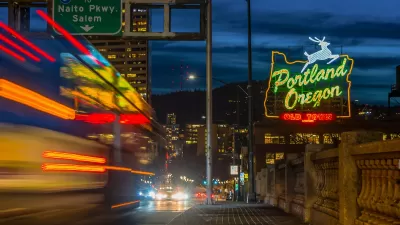A new program is being implemented in Portland, Oregon, to try to quantify and model the behavior of the city.
The effort is seen as a way to understand how various urban systems and functions interrelate, and how tweaking one might affect others -- or the entire system.
"This problem--if you can't measure it, you can't manage it--combined with the impulse to improve cities by models, is driving both IBM's "smarter city" strategy and the nascent "urban systems" movement, which seek to apply complexity science to cities. IBM sponsored the first Urban Systems Symposium in May (where West co-starred in a show-stopping discussion with Paul Romer and Stewart Brand) and today announced the latest plank in its smarter city platform: an "app" containing 3,000 equations which collectively seek to model cities' emergent behavior. IBM also revealed its first customer, the City of Portland, Oregon.
Systems Dynamics for Smarter Cities, as the app is called, tries to quantify the cause-and-effect relationships between seemingly uncorrelated urban phenomena. What's the connection, for example, between public transit fares and high school graduation rates? Or obesity rates and carbon emissions?"
FULL STORY: IBM Partners With Portland To Play SimCity For Real

Planetizen Federal Action Tracker
A weekly monitor of how Trump’s orders and actions are impacting planners and planning in America.

Trump Administration Could Effectively End Housing Voucher Program
Federal officials are eyeing major cuts to the Section 8 program that helps millions of low-income households pay rent.

The 120 Year Old Tiny Home Villages That Sheltered San Francisco’s Earthquake Refugees
More than a century ago, San Francisco mobilized to house thousands of residents displaced by the 1906 earthquake. Could their strategy offer a model for the present?

Philadelphia Councilmember Proposes Transit Access Fund
The plan would allocate 0.5 percent of the general fund toward mobility subsidies for low-income households.

Texas Bill Would Ban Road Diets, Congestion Pricing
A Texas state senator wants to prevent any discussion of congestion pricing and could suspend existing bike lane and sidewalk projects.

USDOT Threatens to Pull New York Highway Funding
The Trump administration wants the state to kill New York City’s congestion pricing program despite its demonstrated success.
Urban Design for Planners 1: Software Tools
This six-course series explores essential urban design concepts using open source software and equips planners with the tools they need to participate fully in the urban design process.
Planning for Universal Design
Learn the tools for implementing Universal Design in planning regulations.
Ada County Highway District
Clanton & Associates, Inc.
Jessamine County Fiscal Court
Institute for Housing and Urban Development Studies (IHS)
City of Grandview
Harvard GSD Executive Education
Toledo-Lucas County Plan Commissions
Salt Lake City
NYU Wagner Graduate School of Public Service





























